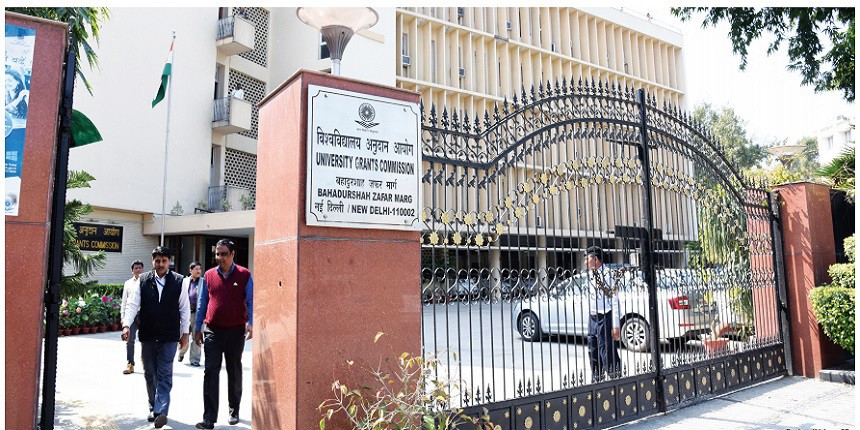05-Apr-2025, 02:52 PM UGC Alerts have introduced new guidelines for accepting foreign degrees. The University Grants Commission (UGC) has issued a comprehensive policy framework aimed at eliminating ambiguity, ensuring timely recognition of degrees, and aligning India’s higher education system with global academic standards. This update is seen as a game-changer in the Indian education ecosystem and is expected to ease the degree validation process for students returning from foreign institutions.
UGC Alerts: A Major Shift in Foreign Degree Recognition
The latest UGC alerts have generated considerable attention among academicians, students, and policymakers. Traditionally, Indian students who pursued higher education overseas faced challenges in getting their degrees recognized in India. Delays in verification, differences in curriculum structures, and lack of clarity around eligibility created confusion and often limited professional opportunities. The new guidelines aim to resolve these long-standing issues with a transparent, structured approach.
These alerts underline UGC’s commitment to modernizing its regulatory framework and supporting Indian students in their global academic pursuits. The revised regulations apply to all foreign degree holders seeking recognition for employment, higher education, or migration purposes within India.
Highlights of the UGC Alerts on Foreign Degree Acceptance
The updated guidelines mentioned in the UGC alerts bring forth several pivotal changes that are expected to streamline the degree recognition process:
1. Accreditation is Essential
Only degrees obtained from accredited foreign universities or institutions will be eligible for recognition in India. The foreign institution must be recognized by its respective country’s education authority and should be listed in an approved database.
2. No Franchise or Collaborative Degrees Allowed
Degrees obtained through franchisee institutions or collaborative setups in India, without direct oversight from the parent foreign university, will no longer be accepted. This is a significant step to prevent diploma mills and safeguard educational quality.
3. Restrictions on Online and Distance Learning
One of the critical points in the UGC alerts is the limited acceptance of degrees obtained via 100% online or distance learning modes. These modes will be recognized only if approved by the relevant regulatory bodies and if the learning meets academic standards equivalent to traditional degrees.
4. Streamlined Equivalence Certificate Process
Students will now be able to apply online for degree equivalence certificates. The process is expected to be faster, with clear documentation requirements and shorter processing times.
Why the UGC Alerts Matter: A Boon for Returning Indian Students
The UGC alerts are particularly significant for Indian students who complete their studies abroad and intend to return to India for employment or further education. Until now, many students faced obstacles due to the non-uniform and outdated recognition mechanisms.
UGC : Employment Opportunities
With the new guidelines in place, students will face fewer barriers when applying for government jobs, public service exams, or roles in Indian corporations. Employers can trust the credentials of candidates whose degrees are certified under this new framework.
Easier Access to Higher Education
Foreign degree holders often find it difficult to secure admission in Indian institutions for post-graduate or doctoral studies due to recognition issues. The new UGC alerts promise to remove these bottlenecks and provide equal opportunity to all qualified candidates.
The Global Perspective: Aligning with International Norms
By issuing these UGC alerts, the Indian education system is moving closer to international best practices. Many countries have already implemented digitized, transparent systems for recognizing foreign degrees, and India’s efforts will enhance its global credibility in higher education.
Enhancing India’s Global Academic Standing
These reforms are part of India’s broader efforts to internationalize its education ecosystem, promote mobility of students, and attract foreign universities to set up campuses in India under the NEP 2020 vision.
Supporting “Study in India” and “Study Abroad” Campaigns
The UGC alerts directly support national missions like “Study in India” and “Study Abroad Return to India” by making it easier for students to switch between international and Indian institutions.
Digital Transformation of the Degree Recognition Process
The UGC also announced the launch of a digital platform for online submission and processing of foreign degree equivalence applications. This step aligns with the government’s Digital India mission and aims to reduce paperwork and manual intervention.
Faster Turnaround Time
Under the new system, equivalence applications are expected to be processed within 30 working days, provided the documentation is complete. This reduces the long waiting periods that students have traditionally faced.
Transparency and Accountability
Applicants will be able to track the status of their submissions and receive digital certificates once the recognition is approved. The digital audit trail ensures that all stakeholders are accountable for the timely delivery of services.
UGC, Challenges Ahead: Is the System Ready?
While the UGC alerts have been met with optimism, education experts believe there may be initial implementation challenges. These include:
-
Technical readiness of the digital portal
-
Awareness among students, institutions, and employers
-
Consistency in evaluating diverse degree formats and curricula
The success of these guidelines will depend on how quickly and effectively UGC and affiliated bodies train staff, update policies, and educate the public.
UGC Alerts as a New Chapter in Global Education Integration
The fresh UGC alerts on accepting foreign degrees mark a progressive step in transforming India’s higher education system. By reducing delays, eliminating confusion, and embracing digital transformation, UGC is enabling a smoother transition for foreign-educated students into the Indian academic and professional environment.
These reforms not only address long-standing concerns but also prepare India for a future where academic mobility is the norm. For students, educators, and employers alike, this new policy offers clarity, speed, and trust—qualities essential for any modern education system.





